#Saving Jews and Gentiles
Explore tagged Tumblr posts
Text
GREAT NEWS THE LORD IS AWESOME....THANKS FOR YOUR PRAYERS🙏💖🙏💗
IT IS OVER 2 YEARS NOW CLOSE TO 3 THAT WE HAVE BEEN PRAYING FOR SICK CHILDREN.
REMEMBER ARCHER ??? HE IS CANCER FREE PRAISE THE LORD AND HIS MOM NOW BELIEVES IN THE POWER OF PRAYERS.



instagram
GOOD NEWS ABOUT CILLIAN TOO.



ALSO MELISSA LAST YEAR HAD A STROKE, SHE IS RECUPERATING THANKS TO THE HELP OF LOGAN HER DEAR HUSBAND. SHE HAS 2 BEAUTIFUL LITTLE BOYS.



THE OTHER CHILDREN THEO, AUBREY, IRIE, MARCO AND OTHERS ARE DOING WELL.
THANKS FOR YOUR PRAYERS, THE LORD IS AWESOME, CONTINUING TO PRAY FOR THEIR COMPLETE HEALING, DELIVERANCE AND SALVATION. PRAISE THE LORD.
IF YOU HAVE ANY SUCH REQUESTS DO NOT HESITATE TO CONTACT US. GOD BLESS YOU ALL.
MARANATHA
📯👑📯
🇮🇱👑🙏
🙏💖🌺🦋🕎✝️👑🇮🇱📯🕊️🕯️🧡
#Instagram#LORD OF THE MIRACLES LORD JESUS CHRIST MASTER PHYSICIAN#ISAIAH 53#SAVING JEWS AND GENTILES#THANK THE LORD FOR ARCHER CILLIAN MELISSA#PRAYING FOR THEO AUBREY IRIE MARCO AND MANY OTHER CHILDREN AND THEIR FAMILIES#TO THE LORD ALL THE GLORY
15 notes
·
View notes
Text
STOP THE HATRED PROPAGANDA 🛑🚨🛑
Another murder caused by hainous hatred of Jews.
youtube









YARON BOUGHT AN ENGAGEMENT RING FOR SARAH, HE WAS GOING TO PROPOSE TO HER NEXT WEEK IN JERUSALEM.
😢😥😓
To @samheughan @caitrionabalfe this is what your ignorant propaganda messages based on LIES does.
AM YISRAEL CHAI

📯👑📯
🇮🇱👑🙏
🙏💖🌺🦋🕎✝️👑🇮🇱🕊️📯🕯️🧡
#YESHUA HAMASCHIACH IS TO RETURN TO REMOVE ALL THIS HATRED AND EVIL#ISAIAH 53#SAVING JEWS AND GENTILES#LORD JESUS CHRIST YESHUA HAMASCHIACH SAR SHALOM PRINCE OF PEACE#MESSIAH#BARUCH HABA B'SHEM ADONAI#BLESSED IS HE WHO COMES IN THE NAME OF THE LORD#Youtube
4 notes
·
View notes
Text
THE CUP OF SALVATION 🍷




WHY AT THE PASSOVER SEDER MEAL ARE THERE 4 CUPS????
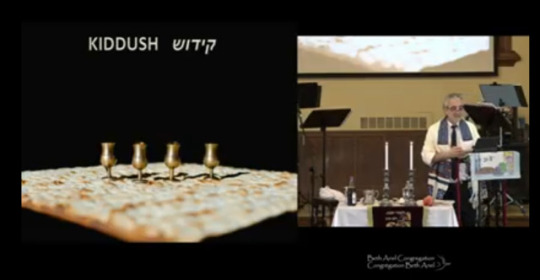
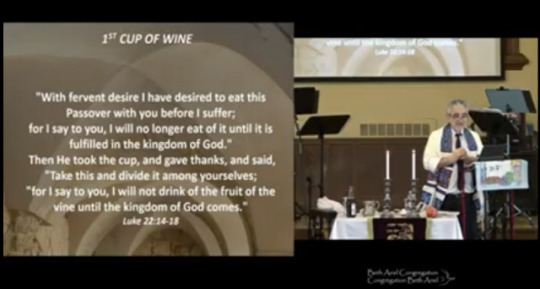
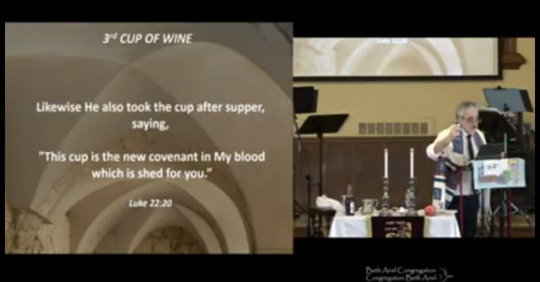
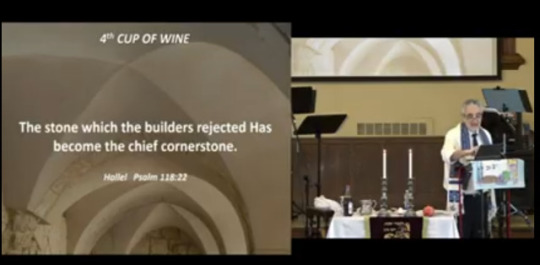

1ST CUP OF BLESSING, 2ND CUP OF HAGGADAH OF REDEMPTION, 3RD CUP OF RESURRECTION, 4TH CUP OF SALVATION.
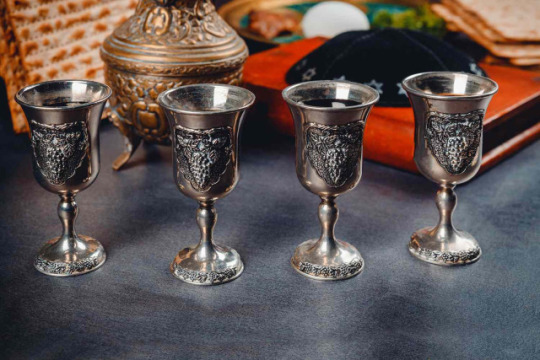
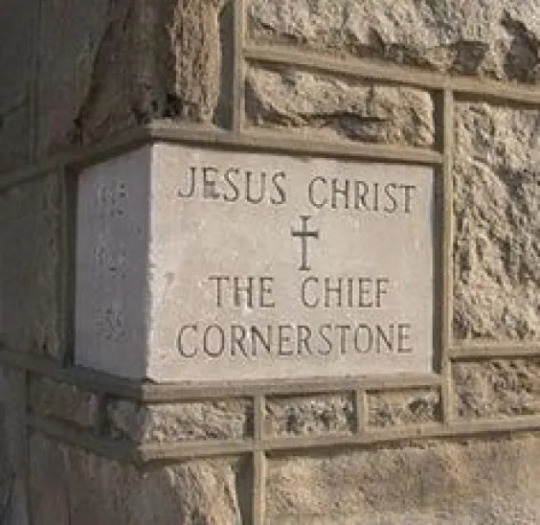
Revisit this EXPLANATION OF THE 4 CUPS AT 01H02 ON THIS VIDEO.
From Messianic Leader Jacques I. Gabizon of Beth Ariel Congregation.
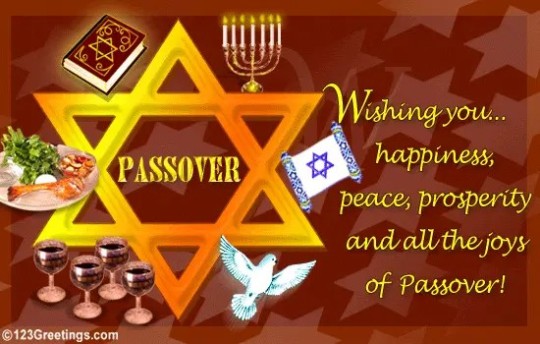
Amen.
📯👑📯
🇮🇱👑🙏
🙏💖🌺🦋🕎✝️👑🇮🇱🕊️🇮🇱🕯️🧡🍷
#4 cups of the Seder Passover Meal#Yeshua HaMaschiach Saviour of the world#Lord Jesus Christ Lamb of God who saved the world#Isaiah 53#Saving Jews and Gentiles#ONEFORISRAEL.ORG#BETHARIEL.CA#MESSIANIC LEADER JACQUES I. GABIZON BETH ARIEL CONGREGATION#1st cup of Blessing 🍷#2nd cup of Redemption 🍷🍷#3rd cup of Resurrection 🍷🍷🍷#4th cup of Salvation 🍷🍷🍷🍷
4 notes
·
View notes
Text
GEES GEES BREAK.... SO SWEET 💖🌺💓
youtube
CHILDREN AND HORSES PERFECT MATCH.
youtube
AND SUCH IS THE KINGDOM OF HEAVEN.
👶🐴👶
📯👑📯
🇮🇱👑🙏
🙏💖🌺🦋🕎✝️👑🇮🇱🕊️📯🕯️🧡
#Isaiah 11#Perfect world when Lord Jesus Christ will reign during the Millennium#World at Peace#Isaiah 53#Saving Jews and Gentiles#April the Month of the Lord's Passover#Youtube#Children and pets GeesGees 🐎🐎🐎
3 notes
·
View notes
Text
When Gentiles say "Never Again": We should all learn a moral lesson from the Holocaust and remember not to allow crimes against humanity to be committed against any group of people. Bad things are wrong and we should not do bad things to people.
When Jews say "Never Again" about the Holocaust: We have learned that no other nations will protect us, so we will never allow the nations to commit genocide against us again - we will defend ourselves, we will protect Jewish life and sovereignty, we will depend on our army, our state, and our community. Our survival will be insured by Jewish strength, not by the undependable mercy or goodwill of the nations, because those did not save our families.
598 notes
·
View notes
Text
WHAT IS FEAST OF FIRSTFRUITS ???? 🌾🍂🍎🍞🍷


On the first day after Passover, farmers would go out to look at their harvest to find the buds that sprang first. They would have special ribbons to mark those buds, and for the next fifty days they will tend their crop, paying careful attention to the ones they had marked. On the third day after Passover, the farmer would walk around again, and those buds that were ready to be presented would be cut right away, taken to the temple and waved before God. Of course, this speaks to us of Yeshua rising again on the third day, the firstfruits of those to be resurrected.
INDEED, THE LORD JESUS CHRIST IS THE FIRSTFRUIT OF THE RESURRECTION.








Amen.
📯👑📯
🇮🇱👑🙏
🙏💖🌺🦋🕎✝️👑🇮🇱📯🕊️🕯️🧡
#LORD JESUS CHRIST OUR PASSOVER LAMB#LAMB OF GOD THAT TOOK THE SINS OF THE WORLD 🌎🌏🌍#LORD JESUS CHRIST SAVIOUR OF THE WORLD 🌎🌏🌍#ATONEMENT FOR SINS MADE THROUGH THE BLOOD OF THE LAMB OF GOD#ONEFORISRAEL.ORG#LAMB OF GOD WHO TOOK ALL THE SINS OF THE WORLD 🌎🌏🌍#ISAIAH 53#SAVING JEWS AND GENTILES#HOSANNA IN THE HIGHEST#YESHUA HAMASCHIACH SAR SHALOM PRINCE OF PEACE#PSALM 23#MAN OF SORROWS#BARUCH HABA B'SHEM ADONAI#BLESSED IS HE WHO COMES IN THE NAME OF THE LORD#MESSIAH#CHAG PESACH SAMEACH#HAPPY PASSOVER#RESURRECTION SUNDAY#Feast of Firstfruits pointing to the Resurrection of our Lord Jesus Christ
2 notes
·
View notes
Text
One of the reason that Christian alternatives to supersessionism tend to result in an incoherent theology is that Judaism and Christianity are addressing different audiences and different problems.
Judaism is ultimately only addressing Jews. We have some universalist passages in our scripture and we're not unconcerned with humanity as a whole, but gentiles don't need Judaism.
Christianity addresses all humanity and everyone needs it.
Similarly, the main point of Christianity for the Christian is salvation from sin (and Hell and death). It's highly individualistic on one hand (it is the individual, not humanity as a whole, that is saved), but at the same time it's addressing a universal problem.
The main point of Judaism for the Jew is... and we already have a problem. Judaism isn't for individual Jews; it's for the Jewish people. Its promise of redemption from exile (literal and metaphorical) is particularist on one hand (it's only relevant to Jews), but on the other it's not individualistic (the Jewish people as a whole will be redeemed from exile*).
*It actually gets a bit more complicated when we start talking about resurrection and the world-to-come, which sometimes is framed in more individualistic terms.
So if you try to do dual-covenant theology (for example), you're faced with a problem. The Jewish people's covenant with God isn't primarily about sin and the salvation it promises isn't primarily for the individual. Judaism does not promise the individual Jew that she will not be subjected to oblivion or eternal conscious torment because that isn't what the covenant is about.
Paul didn't have this problem because (imo) Paul didn't conceive of Christianity primarily in individualistic terms. Paul saw Christianity as grafting gentiles onto the olive tree of the Jewish people; gentiles now share in the collective redemption of the Jewish people.
But that isn't how Christianity came to understand Paul or develop their theology. They came to understand Paul as being individualistic in his understanding of salvation and built an entire theological edifice on a primarily individualistic soteriology. And that kind of soteriology requires supersessionism if it's going to acknowledge Judaism at all because otherwise Judaism is just some weird project God got involved with as a hobby before he started the real work of (individual) salvation from sin.
#christianity#judaism#soteriology#theology#supersessionism#it's very relevant to this post that I think paul believed in universal salvation#but I've gone into that in other posts#epistemic status: pondering and musing not authoritative or scholarly
39 notes
·
View notes
Note
The weirdest question I have about william martin joel is… who is he? /genuine (take this as an opportunity to tell me everything about him and then some I really truly wanna know who that dude is)
I think my thesis about Billy Joel is that he's such a keen observer because he was in the middle of a defining part of American history, but always as something of an outsider. Billy Joel grew up in Levittown in the 50s and 60s, which was the original suburban America experience. Literally the original. A lot of people know this, but I think way too many people assume he is personally representative of the middle class white culture we've come to associate with suburbia. The Joels were the only Jewish family in the neighborhood and one of the few in the area at the time. He didn't know any other Jewish people outside his family growing up, which I can relate to because I had the same experience decades later in Ohio. That was no small thing. The kind of open antisemitism that was still commonplace in the 50s can be really jarring to younger people. Kids threatened to beat him up for "killing christ" and told him he was going to grow horns and those are just the anecdotes I remember off the top of my head.
The neighborhood was mostly Catholic, which is relevant because Billy Joel's parents got divorced when he was about 10 at a time when divorce carried a heavy stigma. He spent most of his childhood being raised by a divorced single mother and they were also the poorest family in the neighborhood because his father wasn't giving them money (or contacting them at all) and the job prospects for a divorced single mother in the 60s were not good. His mother was also dealing with undiagnosed mental health issues that we don't have a lot of details about (possibly more in the upcoming documentary) and there are some wild anecdotes about that, but the relevant part for these purposes is the stigma. It makes it make a little more sense that he spent a short period of time in his early 20s couch surfing and sleeping in laundromats instead of going back to his mom's house. When he started playing music professionally in high school he was using the money he made to help support the family.
So from the beginning he was at the heart of this defining American experience and participating in a lot of it, but never fully part of the in-group. There's no better position to give you insight into a culture, really. It's not hard to see where the chip on his shoulder defensiveness came from, either. I believe he's been under appreciated for so long because people have historically missed this crucial context.
Billy Joel is also the son of a Holocaust refugee. His father fled Nazi Germany as a teenager. I think this is an important piece of background for understanding him but I also just like it as a reminder of how close the Holocaust is to present day America where I think gentiles sometimes feel more removed than they should. One of the recurring themes of diving into Billy Joel's life is wild antisemitism. He made a joke in the 80s about his house on Long Island being haunted by antisemitic ghosts and then a couple of years later he and Christie Brinkley bought a different house there despite the previous owner's will stipulating that it could not be owned by a Jewish person. People like to joke about Billy Joel being white people music and it's both funny and true but I think sometimes it's worth remembering that American Jews' assimilation into whiteness is conditional and that was even more true in the 1960s and 70s than it is now. I have more thoughts on this but I'm saving them for an essay.
One of the overarching themes I see in his life is his relationship to the concepts of life and death. The message he sent to the audience at the premiere of his documentary at the Tribeca Film Festival said getting older was better than getting cremated. A lot of older people make variations on this joke about aging, but it really gets to me when he does it. One of the other times it's come up was in response to a friend complaining about aging, and he reminded him that "it beats the alternative." Christie Brinkley said that when they were married he would say he didn't want to know when he was going to die, he wanted to know where, so he could avoid the place. He's been saying in complete seriousness that he would like to live forever for a while now and talked about how much he loves living. He even said what he wants to hear at the pearly gates is "just kidding, you can go back to what you were doing." If you know his history you know that's not an unexamined statement.
When he was 21 he put himself in a coma for three days and not long after he attempted suicide again and after that checked into a hospital because he was still suicidal (he was there for three weeks which according to him was because that was just the minimum stay at the time). As much as he likes to play it off, this was pretty serious, and obviously a formative experience in his life. He discusses contemplating mortality in his biography and it's clearly something he's thought a lot about. When you know all that the line in You're Only Human where he says "I wouldn't be telling you this if I hadn't been there myself" hits harder because he really is someone who doesn't take a single moment of life for granted because at one point he was prepared to throw it away. I'm too snarky and cynical to call it inspiring without breaking out in hives, but. I've said before that Vienna is a very personal song and I think it's interesting that he seems to have really figured things out later in life. That's not to say he was never happy, but he had a lot of ups and downs and then went through a period fairly recently where when people asked if he was happy he would say he was "content."
I think what makes him special is how strongly he identifies with the audience. It's why his shows are so good and why sometimes hardcore fans get frustrated-- he's appealing to the people, and the people don't necessarily have good taste. He has a yapper's soul. He genuinely loves doing audience Q&As and masterclasses and they probably go over time more often than not.
I'm not really getting into anecdotes here although I can in a follow up if you're interested, most of them I've told before at least once and this is already long, but the thing that always strikes me is this dude is just everywhere. He knows so many people, he has so many stories about huge things that he was just there for. He's been around for so long that I think the reason people finally started to appreciate him more after the Hurricane Sandy benefit in 2012 is that the two years before that were the first time he'd really gone away since the early 70s and when he came back people realized how much they missed him.
I think something people don't realize is that Billy Joel was this close to not making it. He made four albums that were more or less commercial flops and probably only lasted as long as he did because the Piano Man single got a decent amount of radio play. Even that didn't happen until months after it came out, which was unheard of in the 70s music industry, thanks to a student journalist on a mission. He'd been told to go back to his day job, but he didn't have a day job at that point. People who know him have said if he didn't do music he'd die and he's even the said the same thing about himself, yet he has threatened to quit (at least performing, if not music entirely since early on) enough times that his booking agent said a couple years ago "sometimes the way you feel about your work is the way you feel about yourself." By the time he made the Stranger, he would have been dropped by the label if it hadn't succeeded, though he didn't know that at the time.
Fundamentally he's a New Yorker. Like probably 80 to 90% of his whole deal is just that New Yorkers are just Like That. The people who know him best have consistently pointed out that there are two sides of him and the wisecracking go-fuck-yourself streetwise side is partially a defense and the more thoughtful, intellectual side is more guarded. If you listen to him talk enough you can even start to hear when he goes into the Long Island 1960s tough guy grammar and when he says things like "bourgeois proletariat" and then cracks up about that combination. I think that fundamental tension comes through in just about everything he's ever done, but that doesn't mean it's never been reconciled. He's chilled out so much these days a chunk of his public persona is just recreational curmudgeonliness because that's his thing. He's just some guy from Long Island who plays the piano pretty well and also incidentally he's the extremely famous writer of enduring songs.
33 notes
·
View notes
Text

THURSDAY HERO: Anton Sukhinski
Anton Sukhinski was an eccentric loner who lived in a squalid shack on the outskirts of Zborow, Poland. Considered to be mentally defective, Anton was cruelly mocked by the townspeople as the “village idiot.” Anton may not have been the smartest, richest or most impressive resident of Zborow but during the Holocaust, he was the only one who protected local Jews.
In July 1941, the Germans occupied Zborow and immediately murdered a thousand Jewish men. The rest of the Jews were herded into a ghetto, and the deportations began. Itzhak and Sonya Zeiger, a local Jewish couple with two young sons, escaped from the ghetto along with two orphans who had lost their entire families. Desperate for a safe haven, the Zeigers started approaching their non-Jewish former neighbors, but nobody wanted to get involved.
Only Anton, extremely poor and decidedly odd, was eager to help. Despite his small size (under five feet), Anton singlehandedly built a bunker underneath his shack that was just big enough for the group of Jews to hide in. The six Jews lived in that pit, unable to move or go outside. The only light came from a small kerosene lamp. Despite having very little money himself, Anton now had six people to feed, and he spent his days scavenging for food.
Anton cared for all the Jews’ needs, including removing the bucket that served as their toilet. He did it without attracting attention from the Germans or from his own neighbors, who were eager to get a reward for turning in Jews. At one point, the Germans heard that Anton was hiding Jews, and they searched the home. In their basement hideout, the terrified Zeigers could hear the Nazis storming through the house. They stuffed rags in their sons’ mouths to prevent any sound from escaping.
The Jews in Anton’s basement were never discovered, and they stayed in the pit for nine long months. Zborow was liberated by Russians in 1944 and Anton’s hidden Jews finally emerged, blinking at the sunlight. They went their separate ways, some to Israel, others to the US, another to Uruguay. In 1974, Israeli Holocaust Museum Yad Vashem honored Anton Sukhinski as a Righteous Gentile. The Jews he saved reunited in Israel to pay tribute to this remarkable man.
For saving six people (and all their descendants!), and for showing that heart and guts are more important than wealth, looks or prestige, we honor Anton Sukhinski as this week’s Thursday Hero.
Image: Anton with two of the people he saved
38 notes
·
View notes
Text
HAPPY RESURRECTION SUNDAY... HE LIVES 🕎✝️👑📯🕊️💖

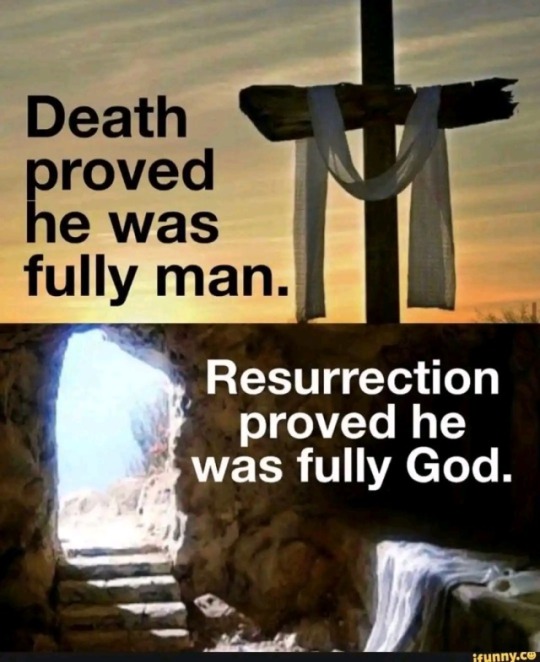

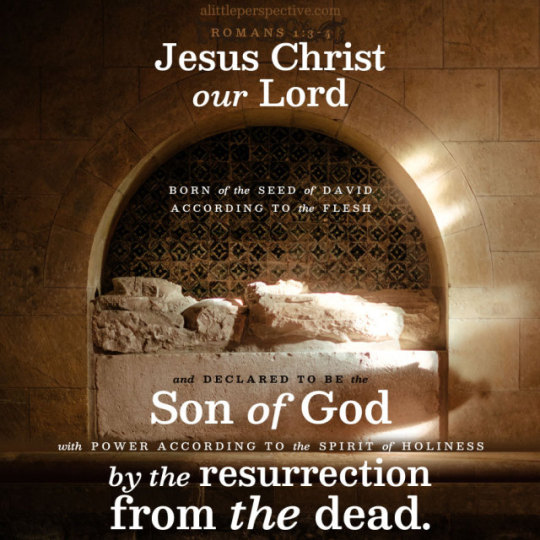






youtube


youtube
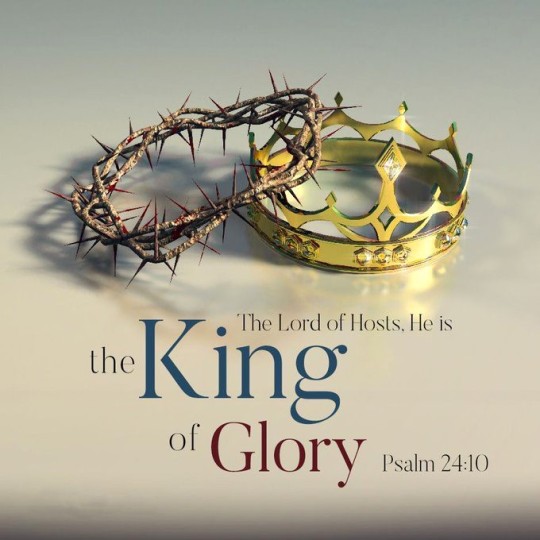
Amen.
📯👑📯
🇮🇱👑🙏
🙏💖🌺🦋🕎✝️👑🇮🇱🕊️📯🕯️🧡
#LORD JESUS CHRIST OUR PASSOVER LAMB#LAMB OF GOD THAT TOOK THE SINS OF THE WORLD 🌎🌏🌍#LORD JESUS CHRIST SAVIOUR OF THE WORLD 🌎🌏🌍#ATONEMENT FOR SINS MADE THROUGH THE BLOOD OF THE LAMB OF GOD#ONEFORISRAEL.ORG#LAMB OF GOD WHO TOOK ALL THE SINS OF THE WORLD 🌎🌏🌍#ISAIAH 53#SAVING JEWS AND GENTILES#HOSANNA IN THE HIGHEST#YESHUA HAMASCHIACH SAR SHALOM PRINCE OF PEACE#PSALM 23#MAN OF SORROWS#BARUCH HABA B'SHEM ADONAI#BLESSED IS HE WHO COMES IN THE NAME OF THE LORD#MESSIAH#CHAG PESACH SAMEACH#HAPPY PASSOVER#RESURRECTION SUNDAY#Youtube
3 notes
·
View notes
Note
Some jewish Noel HCs based on conversations with my jewish girlfriend! To give you the gentile's digest version:
Personally, Noel being a religious jew is my favorite. He would reject the idea that The King and such other entities are actually gods -- which would probably piss Hastur tf off. Something arthur would probably appreciate is the fact that Noel EXPLICITLY would not prostelytize.
I think Noel would observe shabbat weekly (sundown on friday to about an hour after sundown on saturday, by the greogrian calendar) but maybe performs work if necessary (you arent supposed to, but saving lives takes precedent over holidays. Every time he does work during shbbat, he says "that's what Yom Kippur is for"). But his favorite holiday would be Rosh Hashanah. That's one of the holiest days in judaism, and I think he'd hold onto that pretty strongly especially following his experience in the Dreamlands. It requires a lot of prayer and specific customs, and I think that anchoring to his faith and his history would be grounding for him.
TAKING NOTES
#NO CONSIDER !!! He kinda stopped practicing there for a long while but started getting into it again after the dreamlands#like it shook him to his core and he needed that faith to anchor him again#MORE FIRE FOR HOLY GHOSTS BONDING MOMENTS !!!#ask#also personally I don’t think I can 100% commit with religion headcanons just because *I* don’t ever commit to a religion#like what do *I* know about all that?? I’m a silly agnostic who doesn’t think about religion unless prompted !!#BUT that won’t stop Jewish Noel from being a god-tier headcanon
145 notes
·
View notes
Photo

The Letters of Paul the Apostle to the Gentiles
Paul was a member of the Jewish Pharisees in the 1st century CE, who experienced a revelation of the resurrected Jesus Christ. In this vision, Jesus commissioned him to be the apostle (herald) to the Gentiles (non-Jews). After this experience, he traveled widely throughout the Roman Empire, spreading the "good news" that Jesus would soon return from heaven and usher in the kingdom of God on earth.
In the New Testament, we have 14 letters traditionally assigned to Paul, but the scholarly consensus now recognizes that of the 14, seven were written by Paul:
1 Thessalonians
Galatians
Philemon
Philippians
1 & 2 Corinthians
Romans
2 Thessalonians, Ephesians, and Colossians remain debatable among some scholars. The other major letters (1 &2 Timothy and Titus) were most likely written by disciples of Paul’s, using his name to carry authority. The letters that have survived range between 52 and 60 CE, and although we cannot pinpoint when Paul’s letters were collected, Clement, a bishop in Rome in the 90s CE, quoted from 1 Corinthians.
The Nature of the Letters
We understand these letters to be circumstantial. They were not written as systematic theology or as treatises on Christianity. The letters are responses to specific problems and circumstances as they arose in his communities. Paul spent time in cities establishing a group and then moved on. He received letters and sometimes reports with detailed questions or advice on how to settle conflicts. Unfortunately, when Paul’s letters were saved and circulated, the original letters from the communities were not preserved. The reconstruction of the original problems can only be determined by Paul’s responses.
Known as the most famous convert in history (from the Acts of the Apostles), Paul did not actually undergo conversion. Conversion assumes changing from one religious system to another, but at the time, there was no Christian system for him to convert to. Paul himself was ambiguous when it came to his self-identity:
To the Jews I became like a Jew... To those under the law I became like one under the law (though I myself am not under the law) ... To those not having the law I became like one not having the law (though I am not free from God’s law but am under Christ’s law) ... I have become all things to all people. (1 Corinthians 9:20-22)
In relation to what happened to Paul, it is better to follow what he says, in that he was 'called'. This is the tradition of the way in which the Prophets of Israel were called to their individual missions.
I want you to know, brothers and sisters, that the gospel I preached is not of human origin. I did not receive it from any man, nor was I taught it; rather, I received it by revelation from Jesus Christ. (Galatians 1:11-12).
Paul argued that this experience gave him as much authority as the original circle in Jerusalem (Peter, James, and John). Paul’s call to be the Apostle to the Gentiles was shocking because, as he freely admitted, he had previously "persecuted the church of God" (Galatians 1:13). He never really explained what he did, nor why he did it. It is in Paul’s letters that the name Jesus is combined with Christ, the Greek for the Hebrew messiah ("anointed one"). Understood as a title, "Jesus the Christ", it became common as a phrase that indicated his identity and function.
Continue reading...
44 notes
·
View notes
Text
THE 7 LAST WORDS OF THE LORD JESUS CHRIST 🙏🕎✝️👑🕊📯🪔🙏
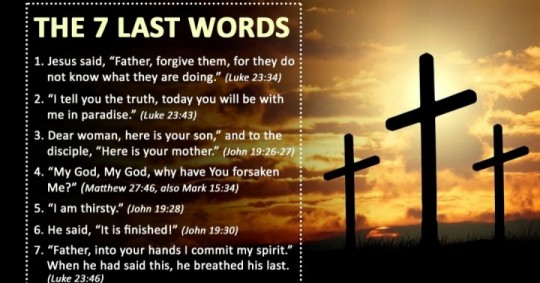
The Seven Last Words of Jesus, recorded in the Gospels, are:
"Father, forgive them, for they know not what they do" (Luke 23:34),
"Today you will be with me in Paradise" (Luke 23:43),
"Woman, behold your son! Behold your mother!" (John 19:26-27),
"My God, my God, why have you forsaken me?" (Matthew 27:46, Mark 15:34),
"I thirst" (John 19:28),
"It is finished" (John 19:30), and "Father, into your hands I commend my spirit" (Luke 23:46).
Here's a more detailed breakdown:
1. "Father, forgive them, for they know not what they do."(Luke 23:34) - This is a plea for forgiveness for those who are crucifying him, showing his compassion and love even in the face of suffering.
2. "Today you will be with me in Paradise."(Luke 23:43) - Jesus speaks these words to the repentant thief who is crucified alongside him, promising him eternal life and fellowship with Jesus in Paradise.
3. "Woman, behold your son! Behold your mother!"(John 19:26-27) - Jesus entrusts his mother Mary to the care of the beloved disciple John, and tells John to care for his mother.
4. "My God, my God, why have you forsaken me?"(Matthew 27:46, Mark 15:34) - This is a cry of abandonment and suffering, expressing his human experience of pain and isolation.
5. "I thirst."(John 19:28) - This simple statement is a cry for physical relief, highlighting his suffering and vulnerability.
6. "It is finished."(John 19:30) - This is a declaration of completion, signifying the culmination of his work and mission to atone for the sins of humanity.
7. "Father, into your hands I commend my spirit."(Luke 23:46) - These are his final words, a trustful surrender of his soul to the Father.
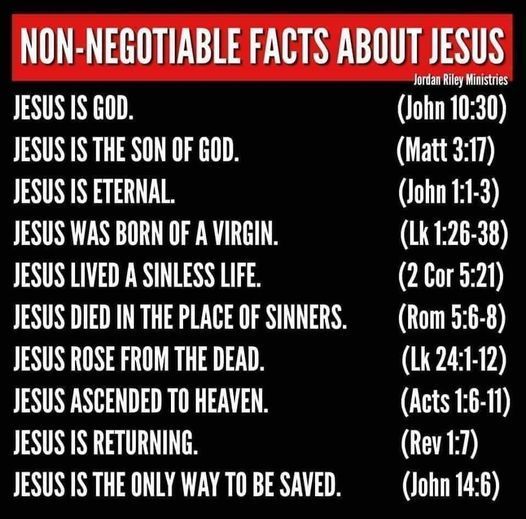
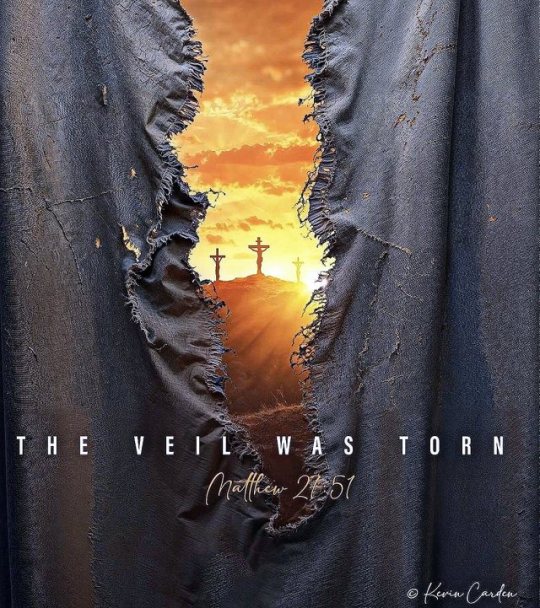
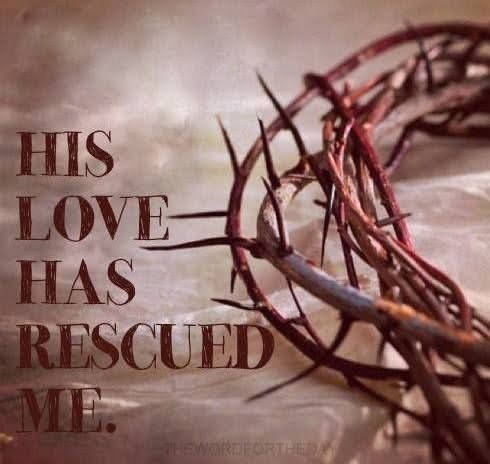
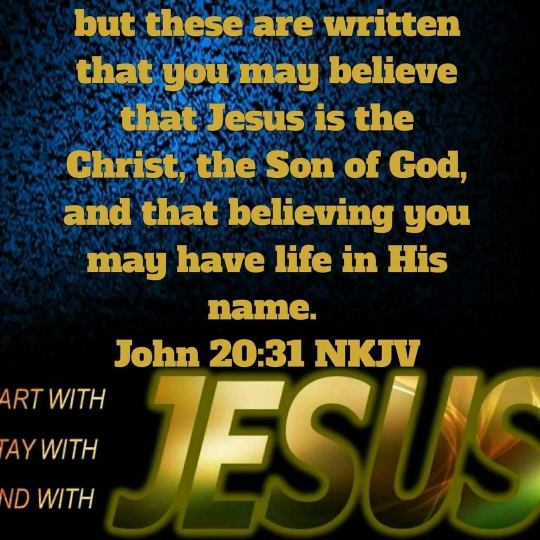
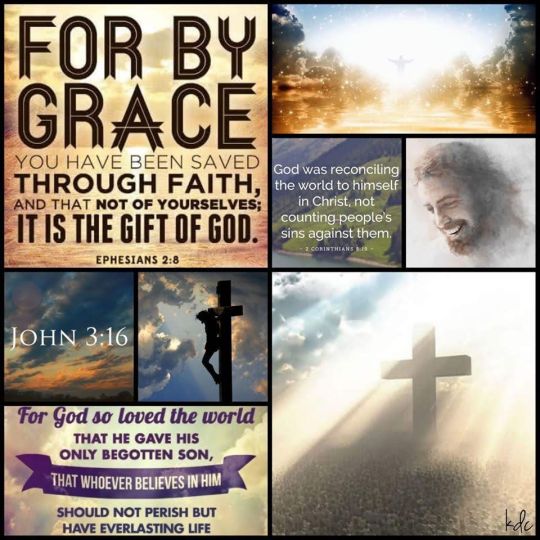

youtube
Amen.
📯👑📯
🇮🇱👑🙏
🙏💖🌺🦋🕎✝️👑🇮🇱🕊️📯🕯️🧡
#7 LAST WORDS OF THE LORD JESUS CHRIST#ISAIAH 53#SAVING JEWS AND GENTILES#LAMB OF GOD THAT TOOK THE SINS OF THE WORLD🌍🌎🌏#CELEBRATION OF PASSOVER PESACH HOLY WEEK AND RESURRECTION SUNDAY#THE LORD JESUS CHRIST HIDDEN IN THE OLD TESTAMENT REVEALED IN THE NEW TESTAMENT#YESHUA HAMASCHIACH SAR SHALOM PRINCE OF PEACE#Youtube
2 notes
·
View notes
Text



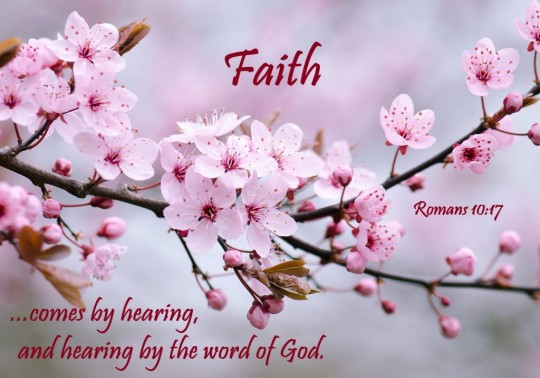


Amen.
📯👑📯
🇮🇱👑🙏
🙏💖🌺🦋🕎✝️👑🇮🇱🕊📯🪔🧡



Amanohashidate, Miyazu City, Kyoto
macchan358
#isaiah 53#saving jews and gentiles#baruch haba b'shem adonai#messiah#lord jesus christ saviour of the world 🌎🌏🌍#yeshua hamaschiach sar shalom prince of peace#hosanna in the highest
1K notes
·
View notes
Text
Wait Cecil these are ALL comics this time
yeah I’m reviewing for finals and looking for summer jobs I after the Bemis essay I just want a post of react to some photos of panels of comics I have on my shelf
Arrival: Shaun Tan’s arrival is about an immigrant who moves from The Old Country to a confusing New Country brimming with new creatures and contraptions and unfamiliar cultural mores. While each immigrant in this story bears on tangential relation to the euroasian cultures each of them visually resemble says a lot of intersting thing about how coding says. There is no antisemitism in this one just me arguing that the Asian girl being Asian is significant and the refugee family being from a place that looks like 1930s Italy adds more meaning to the work
House of M: isn’t the political satire where the world is literally run by a powerful family of jews (who are also all Romani) is pretty antisemitic? It’s not even well written so while the premise is interesting and novel we all have recognize our favorite overrated comic is based on a Rothschild conspiracy. I love House of M to bits and have read most of them so I know what I’m saying
Weird War III: the folly of making your nazis generic bad guys snd having your one Jewish character have almost no agency and giving it to her gentile girlfriend all while putting her in the body of her counterpart and effectively silencing them both.
Whistle: I think the story where the teenage Jewish girl gets into organized crime to save her ailing mother is compelling but did they have to fumble it so bad and did superpower have be the power of dogwhistle (which thankfully summons literal dogs, but still)
vote what you’d like to see the most/soonest not what you think is the “right” choice because there is no right choice
21 notes
·
View notes
Text

Happy Feast Day
Pope St. John XXIII
1881-1963
Feast Day: October 11
Patronage: Papal Delegates, Patriachary of Venice, Second Vatican CouncilCanonized 2014
Pope John XXIII, affectionally called “The Good Pope”, was born to a large poor sharecropping family. He graduated from college with a doctorate in theology and was ordained a priest in 1904. In 1914 he was drafted into the Italian army and served as a chaplain and stretcher-bearer. Throughout his career, he worked in many church programs including the Society for the Propagation of the Faith, saved thousands of Jews during WWII, was named “Righteous Gentile”, nuncio in France, and Apostolic delegate to Bulgaria, Greece, and Turkey. In 1958 he was unexpectedly elected Pope and in 1962, he called an ecumenical council (Vatican II). He died of stomach cancer in 1963.
Prints, plaques & holy cards available for purchase. (website)
45 notes
·
View notes